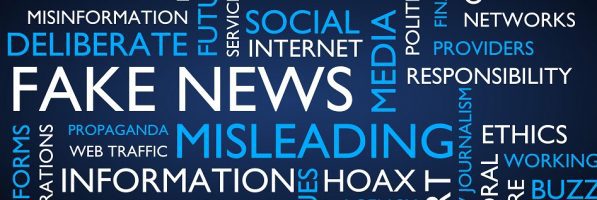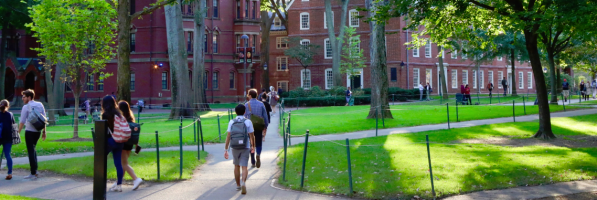Fighting Fake News, Working Mothers, and More – Boston News

Let’s explore some of the most interesting stories that have emerged from Boston business schools this week.
Lazy Thinking, Not Political Bias, Drives Fake News – MIT Sloan Newsroom
MIT Sloan Associate Professor David Rand and the University of Regina’s Gordon Pennycook recently published a new study that illuminates what actually perpetuates fake news—a “lack of analytical thinking.”
Professor Rand writes, “Our study suggests that falling for fake news is a symptom of cognitive laziness rather than motivated reasoning or self-deception. That is, contrary to popular belief, it is not the case that people are thinking too much about the wrong things. Rather, a little thinking might go a long way to fix the problem of fake news.”
In a study that surveyed “3,446 participants to rate the accuracy of headlines from actual news stories from Facebook,” the duo found that “people who engage in more analytic thinking, as measured by the Cognitive Reflection Test, are better at discerning true from false—regardless of identified motivations or political biases.”
You can read more about the research here.
What’s Your Carbon Footprint? You Probably Have No Idea. – D’Amore-McKim Blog
In a recently published study, D’Amore-McKim Professor Amir Grinstein surveyed 1,000 people to “guess the amount of CO2 emitted from burning one gallon of gasoline and the amount of calories in one gallon of whole milk.”
The goal was to “examine people’s knowledge of their own carbon footprint and how they can better educate themselves about the real impact they have on the environment.”
Grinstein believes that in order to change the public’s understanding of its own carbon footprints, they must have a “better understanding of how CO2 emissions play a role in everyday life allows people to decide if they’re willing to step up and change.”
Check out the full article here.
Kids of Working Moms Grow Into Happy Adults – Working Knowledge
New research from Harvard Business School Professor Kathleen McGinn found that, despite the narrative, working mothers often lead to happier and more successful children.
McGinn, the Cahners-Rabb Professor of Business Administration, says, “People still have this belief that when moms are employed, it’s somehow detrimental to their children. So our finding that maternal employment doesn’t affect kids’ happiness in adulthood is really important.”
The preliminary results of McGinn’s work were originally published three years ago, specifically regarding the career success of daughters of working mothers, in contrast to stay-at-home mothers.. When the story reached The New York Times, however, there was some obvious blow-back. McGinn recalls:
“Many decried the research as another installment of the ‘mommy wars.’ But the most common response was from mothers who suffered guilt, self-doubt, and disapproval from others. They found our preliminary results to be welcome news.”
However, McGinn’s research, which was conducted alongside Mayra Ruiz Castro of Kingston University in the UK, and Elizabeth Long Lingo of Worcester Polytechnic Institute, found that the careers of sons of working mothers were not generally effected. Rather, their attitudes were different in contrast to stay-at-home-mothers.
“Sons are influenced in other ways when their moms work. The sons of employed mothers hold significantly more egalitarian gender attitudes—even more so than the daughters of stay-at-home moms, a finding that surprised McGinn because it shows that the influence of maternal employment may even outweigh well-documented sex differences when it comes to shaping people’s mindsets about appropriate roles for men and women.”
You can read more of the ground-breaking research here.
Harvard Adcom Director Launches Application Tips Series

Clear Admit recently spoke with Chad Losee, the Managing Director of Admissions and Financial Aid at the Harvard Business School, which you can read in full below.
Clear Admit had the pleasure of sitting down with Harvard Business School Managing Director of Admissions and Financial Aid Chad Losee a few weeks ago when we were in Boston for the annual Graduate Management Admission Council conference. Losee shared then his plans to launch an Application Tips series on his blog. True to his word, he kicked things off earlier this month.
Each week, he plans to tackle a different element of the application, offering suggestions for how to approach it and clearing up any misconceptions applicants may have. “My goal is to demystify the written application and give you some simple, practical suggestions for putting together your story,” he wrote.“When July hits, I know from personal experience that applying starts to feel ‘real’ when you are planning to apply to HBS in Round 1,” he wrote. He’s referring, of course, to his own application process to HBS not all that long ago. (He’s a 2013 graduate of the MBA program.)
Up first, in a July 13 post to his Direct from the Director Blog, he turned his focus to the “Employment History” section of the application. “I think there’s a temptation to just ‘go through the motions’ in this part of the app—maybe because it feels similar to your resume?” he wrote. But doing so means missing a valuable opportunity to help the HBS admissions team really get to know you.
“The employment history section ought to be one of the more self-reflective parts of the application as you step back and take stock of your journey so far,” Losee advised. “Don’t be afraid to show a little personality in your responses!”
This means taking full advantage of the 250-charcter text boxes you’re given to provide details about your most recent three jobs, including your role and responsibilities, company/organization description, reason for leaving, key accomplishments, and most significant challenge.

HBS Managing Director of Admissions and Financial Aid Chad Losee
Use your own words—not an HR job posting or company boilerplate—to explain the most important aspects of your individual role as well as the specific division or team you are a part if you work for a large well-known company. “If you work at a startup or your family business, giving us details beyond what is available online is also very helpful,” he added.
Your reason for leaving can be simple and straightforward. But take the opportunity to “reflect on the ‘why’ of a key transition in your work life,” Losee continued. And do more than simply list key accomplishments or significant challenges—communicate why they were meaningful to you.
Losee will zero in on the essay portion of the application in his next post in the series, followed by recommendations, standardized tests/transcripts, awards/extracurriculars, and résumé.
We think it’s great that he’s taking the time to demystify the HBS admissions process. If you’re gearing up to apply, you certainly don’t want to miss out on what he shared. We’ll capture the essence of his subsequent posts in recaps here, but you can also visit his blog yourself. HBS will also share the tips via Instagram, so if that’s more your jam, you can follow along at @hbsadmissions.
Losee did confess to one hesitation at the outset of the series, namely that applicants might try to follow his suggestions too closely. “The written app is for you to introduce yourself—we designed a lot of ‘space’ in the app for you to tell your story,” he stressed. “If you’re following a rote/cookie-cutter approach we won’t be able to get to know you. So, promise you won’t do that?”
The new “Application Tips” series complements other scheduled HBS events and webinars—be sure to add those to your calendar as well.
Managing a Personal Crisis, and More – Boston News

What’s going on in Boston this week?
How to Manage an Employee Who’s Having a Personal Crisis – Harvard Business Review
The Harvard Business Review recently explored how managers can best support employees to “take care of themselves emotionally while also making sure they are doing their work.”
Annie McKee, author of How to Be Happy at Work and a senior fellow at Penn’s Graduate School of Education, offers three helpful suggestions:
- Set a tone of compassion in the office. It will not only give your employees confidence to approach you with struggles, but also give you the ability to spot warnings signs.
- Be creative with solutions. A flexible schedule may allow a person to maintain their output without much disruption.
- Check in from time to time, both to reassure the employee and to make sure that further adjustments or accommodations aren’t needed.
You can read the full article over at HBR.
Agile at Scale, Explained – MIT Sloan Newsroom
MIT Center for Information Systems Research’s Kristine Dery is currently studying how agile management—the increasingly popular management methodology adopted by the likes of Microsoft, Ericsson, and Spotify—relates to the employee experience.
MIT Sloan School of Management senior lecturer and industry liaison Carine Simon writes, “The traditional method of managing, the waterfall method, which is very inflexible, planned-in-advance, linear, and not iterative at all, wasn’t lending itself at all to the flexibility and the adjustments that were necessary to make great software.”
Simon adds, “[Agile is] iterating with customer feedback, prototypes, and tests, versus taking some requirements and issuing the product maybe a year later, when the customer’s requirements have changed or technology has evolved.”
Many companies have taken note of agile’s prevalence and begun to “ask whether the method’s practices and philosophies could be scaled up to apply with equal success to other projects or even entire business functions,” according to Simon and Dery.
Simon continues, “In customer-centric processes where customer input is key, and in that sense it’s quite uncertain or fast-changing, then those would be the types of areas in a firm that lend themselves to agile.”
Check out the full article here.
Questrom Professor Named 2018-19 Batten Fellow – Questrom Blog
BU Questrom School of Business‘ Siobhan O’Mahony was recently awarded a 2018-19 Batten Fellowship by the Batten Institute for Entrepreneurship and Innovation at University of Virginia Darden School of Business.
The Batten Fellows program, according to Darden, “provides support for prominent thought leaders and high-potential scholars who seek to generate new knowledge about entrepreneurship and innovation.”
O’Mahony, an Associate Professor of Strategy & Innovation and Academic Director of Research and Curriculum for Innovate@BU, explores how “technical and creative projects organize for innovation.”
O’Mahony plans to use her fellowship to “research entrepreneurial ecosystems and how those systems influence entrepreneurs and their efforts around venture creation.”
Read all about O’Mahony’s fellowship as part of the full article here.
Cryptocurrency Volatility, a Vacation App, and More – Boston News

Let’s explore some of the most interesting stories that have emerged from Boston business schools this week.
Digital Tulips: High Risks, High Rewards in ICOs – Carroll School News
Boston University Carroll School of Management Assistant Professor of Finance Leonard Kostovetsky and Ph.D. candidate Hugo Benedetti (’19) recently co-authored a draft paper that explores how the high returns associated with Bitcoin, for instance, are in part a byproduct of the uncertainty that surrounds cryptocurrency. But as crypto becomes clearer, the researchers note that “that effect might be declining.”
The Social Science Research Network published the duo’s paper, entitled “Digital Tulips? Returns to Investors in Initial Coin Offerings,” which finds that “startups set a low, low price at the initial coin offering (ICO) stage to compensate for the volatility. In effect, it’s an uncertainty discount that keeps the price down, which drives up the returns.”
You can check out the full article on the official BC website.
People Aren’t Using Their Vacation Time. These Alumni Want to Fix That – D’Amore-McKim News
Treehoppr, “an online platform that tracks accrued time off,” was founded by Northeastern University D’Amore-McKim grads Kevin Corliss, DMSB (’16), Douglas Franklin, DMSB/E (’16), and Christopher Kenyon, CCIS (’17), in response to the “uniquely American” reality of how few working professionals take advantage of “paid time off.”

Treehoppr, an app created by a trio of D’Amore-McKim alumni, hopes to solve the uniquely American issue of not taking time off of work.
In an interview with their alma mater, Corliss says, “We want to help people eliminate these barriers to travel. What are the things you always hear when you ask people about traveling? They don’t have the time, the money, or the know-how when it comes to a foreign country. We want to help people solve all those issues.”
Dive into the trio’s story here.
The Gourmet MBA – Suffolk Experience
Suffolk University recently published a profile on current Sawyer Business School MBA Danielle Health (’19), whose @BostonBehavior Instagram profile demonstrates her knack for monetizing that very 21st century ritual of the meal snapshot—one she’s parlayed into a full-time job at social media management company Metter Media.
Health explains that she generally approaches the manager of “each restaurant she wants to visit as a one-time business partner.” She explains that her Instagram affords restaurants quite “a lot of visibility for a pretty minimal investment.”
She continues:
“Bigger food bloggers might have 100,000 followers. But that doesn’t matter if the people aren’t in Boston. About 90 percent of my followers are local to the Boston area, and most are my age. So I can deliver a really targeted and high-value group to a restaurant that I put on my feed.”
Check out the full profile here.
Best MBA Internship Opportunities in the Northeast

There’s no doubt that summer internships play a critical role in an MBA student’s education and career. Not only do internships provide students with the opportunity to gain hands-on experience in the workforce, but they’re also known for helping students develop professional connections and earn top-tier salaries.
But not all internships are made equal, especially for talented business school prospects. For example, working at Apple would likely have a very different effect on an MBA’s resume than working for a small, unknown startup company down the street. And if you’re looking at the top cities across the U.S. where companies actively recruit talent, you can’t go wrong with Boston, New York City, or Philadelphia for your location. But which is the best?
In this article, we highlight the top internship destinations in each city along with the top two schools in each area that will get you where you want. Continue reading…
Can Society Keep Up with Tech Entrepreneurs? – Boston News

Let’s explore some of the most interesting stories that have emerged from Boston business schools this week.
When Technology Gets Ahead of Society – Harvard Business Review
The Harvard Business Review recently dove into work by professor and Harvard‘s Lakshmi Mittal South Asia Institute Director Tarun Khanna that examines tech entrepreneurs’ “insouciance about the legal and social issues their innovations birth.”
Khanna explains that one pervasive issue we are collectively trying to negotiate is that necessary “regulatory, logistical, and social barriers” often struggle to keep pace with new and increasingly disruptive technologies.
“Although electric cars are subsidized by the federal government, Tesla has run afoul of state and local regulations because it bypasses conventional dealers to sell directly to consumers. Facebook is only now facing up to major regulatory concerns about its use of data, despite being massively successful with users and advertisers.”
Khanna argues that instead of shortening the “period between the advent of a technology and the emergence of the rules and new behaviors that allow society to embrace its possibilities,” Khanna encourages tech leaders to “take more responsibility for the whole ecosystem and bring regulators and consumers along with them, all of society stands to benefit.”
You can check out the full article here.
Machine Learning Will Redesign, Not Replace, Work – MIT Sloan Newsroom
MIT Sloan’s Erik Brynjolfsson, Carnegie Mellon’s Tom Mitchell, and Daniel Rock, a doctoral candidate and researcher at the MIT Initiative on the Digital Economy, published new research in the American Economic Association Papers and Proceedings, which finds that automation will most likely replace “specific tasks within jobs, rather than entire occupations themselves.”
Brynjolfsson writes, for instance, about deep neural networks that are adept at “tasks involving predictive analytics, speech and image recognition, and natural language processing, among others.”
The researchers write, “Automation technologies have historically been the key driver of increased industrial productivity. They have also disrupted employment and the wage structure systematically.”
“However, our analysis suggests that machine learning will affect very different parts of the workforce than earlier waves of automation. Machine learning technology can transform many jobs in the economy, but full automation will be less significant than the re-engineering of processes and the reorganization of tasks.”
You can read the full article here.
Northeastern Recognized For Excellence in Fostering Entrepreneurship – D’Amore-McKim Blog
At its recent Symposium for Innovation and Entrepreneurship, the Deshpande Foundation bestowed its 2018 Entrepreneurial University Award on Northeastern for the school’s “overall excellence in innovation and entrepreneurship.”
The Deshpande Symposium assembles “policy planners, academics, and practitioners from around the globe to discuss best practices for integrating entrepreneurship through university and college communities.”
This marks the second time in four years that Northeastern was honored at the Deshpande Symposium, having won the 2015 Excellence in Student Engagement in Entrepreneurship award.
Of the Entrepreneurial University Award, D’Amore-McKim Dean Raj Echambadi writes, “We pride ourselves in creating and training ‘Chief Entrepreneurial Officers’ who think differently and are capable of solving the grand challenges of business and society in a global economy.”
“This award is a testament to the strength of experiential learning through the integration of rigorous classroom education and real-world entrepreneurial engagement.”
The full article can be found here.
